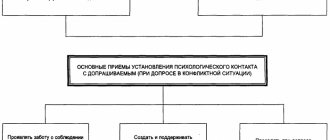What it is
An interrogation is an investigative procedure conducted to obtain information that will help find out what really happened. During this process, the information obtained is recorded in a protocol for further use. Interrogation can be carried out at the investigation stage and at the trial itself. Audio and video recordings are also carried out.
Witnesses of the incident, suspects, the victims themselves, experts and specialists in any field can be questioned. Typically, these individuals may have knowledge of certain circumstances relevant to the ongoing investigation. Children and minors may be interviewed, but only in the presence of a representative appointed by law.
Interrogation is divided into:
Free legal consultation
+8 800 100-61-94
- Initial – the person is interrogated for the first time and immediately after the incident;
- Repeated – appointed for the purpose of clarifying and clarifying certain details of what happened;
- Additional – carried out when new important details have appeared in the case
- with bias - in this case, psychological methods of pressure are applied to the person giving evidence.
Rights and obligations of interrogated persons
The interrogation of a suspect under the Code of Criminal Procedure of the Russian Federation is carried out in order to obtain information relevant for the investigation and further consideration of the criminal case in court. On the one hand, this investigative action is a source of information, but on the other hand, it acts as a means of protecting a citizen from suspicions brought against him.
| Rights | Liabilities |
|
|
A suspect participating in a case on behalf of the defense has the right to refuse to provide evidence. It will not be held liable for intentional perjury. It is important that refusal to provide evidence or making changes to it is not the basis for confirming the guilt of a suspected citizen. Regardless of the will of the person, a citizen detained on suspicion of committing a crime is interrogated.
Watch the video below about the questioning of witnesses:
Rules for conducting investigative actions (Part 2 of Article 46 of the Code of Criminal Procedure of the Russian Federation):
- The interrogation is carried out in the presence of a defense lawyer for 24 hours after the person’s arrest;
- Before the start of the investigation, the suspect has the right to a confidential conversation with a defense lawyer (at least 2 hours);
- At the request of a citizen suspected of committing a crime, other persons may participate in the interrogation - a translator, an expert, etc.
Features of the procedure in a criminal case
In forensic science, during interrogation, not only the verbal component of a person is taken into account, but his facial expression, gestures and motor movements made at that moment, the tone and nature of the spoken speech. It is carried out during the preliminary investigation of the incident, as well as during the preliminary investigation into the incident. At the time of inquiry and during the trial.
The following methods are available:
- indirect - in this case, by asking insignificant and abstract questions, attention is drawn to them, after which, at the most unexpected moment, the most important question is asked, which is important for the matter;
- with an accelerated pace - secondary simple questions are asked that do not require any thinking, but their pace gradually increases and when mechanical answers begin, questioning begins to take place, which is of primary importance in the investigation;
- Confrontation is an action that is prescribed when contradictions are discovered in the testimony, then two persons who gave opposite information are called and interrogated, while the interrogated persons can ask each other questions, refute or confirm the words of the other.
Attention! During the event, criminologists can use some psychological techniques.
The most common of them are relieving tension, making a person feel safe, or, on the contrary, creating tension so that the person being interrogated feels in danger and in a hopeless situation.
At the same time, the weak points and positive qualities of the individual are recognized in order to apply them in the future if necessary. The investigator can admit, cross lies, use legends, use the moment of waiting and distraction.
Rules for interrogation
There is an approved interrogation procedure, which is outlined in the criminal code.
When is it carried out?
They are summoned for questioning with a summons indicating the time and place of the event. It also states the consequences if a person fails to appear at the trial without a valid reason.
Interrogation participants
Witnesses of the incident, victims, and preliminary accused are called. The interrogation is conducted by an authorized person. Minors are interrogated in the presence of other authorized persons.
Also at this moment there are persons who record or record the process. Those being interrogated have the right to invite their lawyer to the trial. He makes sure that there are no violations against his ward.
How long can it last
The law establishes that an event cannot last more than four hours. You can continue the process if you set an hour break.
To eat and rest. In total, interrogation is not conducted for more than eight hours a day. If the person called has medical contraindications, then the time is determined by the attending doctor.
How it goes
First, a summons for interrogation is sent. Before starting the process, the investigator must comply with all established requirements. Writes down the name of the person participating in the interrogation. If the interrogated person allegedly does not speak the state language, then he is asked in what language he will answer and, if necessary, an interpreter is invited. Then they explain the essence of the interrogation, read out the rights and indicate the reasons why the person was summoned for a conversation.
The investigator is free to choose interrogation tactics, but does not have the right to ask leading questions. The interrogated person may use any documents or records. During the interrogation, filming and video recording are being conducted, conversations are being recorded on a dictaphone, and a protocol of the process is being kept. At the end of the event, the filmed materials are sealed and are not publicly available.
Reference! The protocol drawn up during the interrogation is given for review to the criminologist, the person who was interrogated, and his lawyer, if one was present. It is signed on every page.
What happens if a person does not appear for investigative actions?
In Art. 139 of the Code of Criminal Procedure of Ukraine, in the event of a citizen’s failure to appear when called by the prosecutor or investigator, certain penalties will be provided. If a witness or suspect has received a subpoena and been made aware of it, but fails to appear at the specified time or date, then they must be made aware of the following consequences:
- Fine. This decision is made by the investigating judge only after a request has been received from the investigator or prosecutor. As a result, the monetary penalty will be imposed not by the person who sent the summons, but by the court. The size of this penalty varies from 0.25 to 0.50 of the subsistence minimum.
- A drive is used (item 140). This decision is also made by the court according to the received petition. A drive is a forced accompaniment of a citizen for interrogation. If it fails, physical force may be applied.
- Bringing to administrative responsibility. This is the most severe punishment a person can receive as a result of repeatedly refusing to be interviewed. This information is specified in Article 185-4 of the Criminal Code of Ukraine on administrative violations. The judge reviews the protocol of violation drawn up (the document is drawn up by the investigator or prosecutor) and sets the amount of the fine.
The above measures can only be applied if the citizen fails to appear for questioning without good reason. The list of valid reasons includes: serious condition, death of a relative, late receipt of a summons, etc.
What is an interrogation protocol
This is a document that records what is happening at the time of the event in the same sequence as it happened without making changes. All questions and answers are written down verbatim, with the time recorded, and the case number, full name of the investigator and the person being interrogated are indicated. They write that there was a warning about liability for giving false data.
If there was a refusal to answer, then write down the reason. If photography, video shooting, or audio recording took place during the event, this must be reflected in the protocol. Record information about the equipment and the moment of recording.
After finishing the protocol, the investigator and the interrogated person read and sign page by page . If a person used pictures, drawings or any diagrams to answer, then they are added to the document. There should be no empty spaces in the document; they should be crossed out to avoid additions after it is signed. If, after review, clarifications are needed in the protocol, they are immediately included in it. Refusal to sign must be legally justified.
Rules of conduct for a suspect
Before the start of the event, a summons is sent indicating the place and time. The suspect has the opportunity to come with his lawyer. If it is not possible to hire a lawyer, the state appoints its representative. It is best to come to the event without additional things. They can be classified as evidence and seized.
When you come to the process you need to show your passport. The data is then entered into the protocol. The essence of the case and the reason for the interrogation are explained, and the investigator explains why the person is considered an accused or suspect in the case.
During interrogation, you can exercise your rights and not answer the questions provided if they threaten the safety of you and your loved ones. The remaining questions must be answered. To avoid psychological techniques, it is best to respond in writing.
During the event, you need to speak clearly, calmly, to the point and in a respectful manner. There is no need to give in to provocations. You cannot use profanity and provoke or create conflict situations.
If the investigator behaves harshly, makes threats and is rude, then you can sue him in accordance with the criminal code for such behavior. Also, criminologists should not give samples of their handwriting unnecessarily, so that it cannot be faked.
When interrogating, it is important to pay attention to gestures and facial expressions. In any case, you must remain completely calm. There is no need to be led by emotions, as this can be interpreted not in favor of the person being interrogated. The gaze should not be confused and run around in all directions, it should be concentrated on one selected point.
Important! If your health deteriorates during this event, you need to call an ambulance and insist on it. In this situation, do not give any evidence.
At what stages is the interrogation carried out?
The interrogation is carried out at four main stages:
- Preliminary . At the first stage, the investigator gets acquainted in detail with the personality of the interrogated person, fills out the respondent’s questionnaire in the protocol, and tells the rules and conditions of this investigative activity. As a result, the investigator must talk about the rights and responsibilities of the person and assess his degree of responsibility in a particular case. At this stage, it would be correct to establish psychological contact with the interrogated person and get acquainted with his biography.
- The second stage is the narration of the interrogated person (free story). A witness, accused or victim, is called to testify and tells everything that concerns the criminal case. At the same time, the investigator should not interrupt the narrator, unless the latter has deviated from the main topic. As a rule, at this stage the investigator can learn many new facts that he was not previously aware of.
- Question and answer stage . Taking into account the information received, the investigator decides what question to ask the citizen to clarify certain facts. Questions should not contain hidden answers, leading answers and be extremely clear and transparent. And the answers should be given extremely accurately or, conversely, depending on the goal you are pursuing.
- Final stage . The interrogation procedure itself can be “main” (the primary interrogation protocol) and “additional” - protocols for additional interrogation of a person. It happens that before the start of legal proceedings, the investigator may call a suspect, witness or victim for questioning for the last time to obtain clarification of facts and eliminate contradictions in the case.
Witness Rules
It is best to come to the interrogation with a lawyer. Such an event should not be treated as formal. Answers can be given in written or oral form. You only need to answer the questions asked on the merits.
Describe in great detail the incident you saw. There is no need to invent or add your own guesses. Give unambiguous answers. If any moment was not completely remembered, then the answer to it is: “I don’t remember.” If the investigator makes assumptions and asks, then the best answer is: “I don’t know.”









